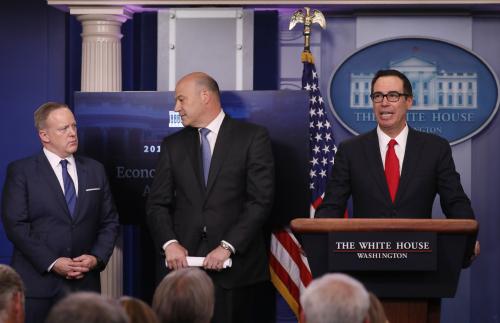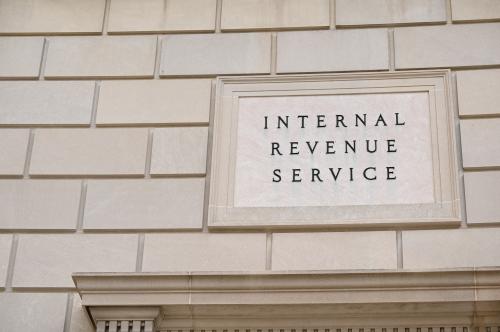This article was originally posted on Real Clear Markets on January 31, 2017.
Steven Mnuchin, Donald Trump’s nominee for Treasury Secretary, is making a surprising, and welcome, case for boosting funding for the Internal Revenue Service, correctly calling it understaffed and “under-resourced,” and arguing that it should be exempt from Trump’s federal hiring freeze.
It may not be popular to say, but the IRS needs more funding. Unpaid federal taxes are almost as large as the entire federal budget deficit.
It may not be popular to say, but the IRS needs more funding. Unpaid federal taxes are almost as large as the entire federal budget deficit. Money is being left on the table. People and businesses who don’t pay what they owe are, in Trump’s lingo, “making a killing.” But when people don’t pay their taxes, they are not just cheating the government. They are ripping off their neighbors. Adequately funding the IRS could raise revenues significantly and give the public assurances that the system isn’t rigged in favor of the wealthy.
Adjusted for inflation, IRS funding in 2016 was the same as in 1998. As a result, IRS employment has fallen about 27 percent – by 30,000 workers – since then.
These cuts have occurred at a time when the IRS is facing increasing challenges. Granted, the advent of electronic filing has reduced the burden on IRS workers per taxpayer, but the number of individual tax returns has increased by a third — from 123 million in 1998 to 163 million in 2015. The IRS is falling farther and farther behind state-of-the-art computing. Many of its computer systems and programs belong in museums – they are running applications from the 1960s. Meanwhile, Congress has asked the IRS to take on new administrative and enforcement responsibilities, including those relating to health insurance subsidies under the Affordable Care Act, the American Opportunity Tax Credit, expansions of the Earned Income Tax Credit, and increased reporting requirements for assets held in offshore accounts under the Foreign Account Tax Compliance Act.
Lower funding combined with increased responsibility creates results that are only too predictable: worse taxpayer service and worse enforcement of the tax system. In 2016, slightly less than half of taxpayers who called the IRS seeking assistance received it, and they had to wait almost half an hour on average to be connected, double the time it took in 2011.
Collection and enforcement efforts have been hurt significantly. In 2015, the IRS audited only 0.8 percent of individual and 1.3 percent of corporate returns, compared to 1.1 and 1.4 percent respectively in 2010 and 1 and 2.1 percent respectively in 1998. The audit rate for households with income over $1 million has fallen by 40 percent since 2010.
The IRS estimates that in 2008-2010, an average of $458 billion per year in tax liabilities were not paid on time, and only $52 billion of that amount will eventually be collected. That leaves $406 billion in taxes owed in each of those years that were never paid. Assuming that such shortfalls go on every year and remain a constant share of the economy, $510 billion of taxes owed in 2016 went unpaid. To put that in perspective, that’s almost as large as the entire federal budget deficit – $587 billion in 2016.
We will never collect every dime is that owed, but the IRS could do far more, if it had the resources. Cutting spending by reducing resources for tax enforcement is penny-wise and pound foolish. Each dollar invested in the IRS yields $4 in higher revenues, with even greater returns for spending on enforcement. Cuts in enforcement personnel alone have cost the government $7 billion annually in lost revenue – all for a couple hundred million in decreased spending.
Nor is it a great mystery where to look for unpaid taxes. Tax compliance is highest when information on income must be provided and is subject to withholding because incomes are more visible to taxpayers and the IRS. For example, only 1 percent of income from wages and salaries is misreported. In contrast, 19 percent of partnership income and capital gains, and more than 60 percent of sole proprietorship and farm income is not reported to the government. Although most noncompliance comes from misunderstanding the law, rather than outright criminal intent, the taxes should still be paid.
Trump ran on getting better results from government based on his business experience. If the IRS were a business, it would have failed by now. We can have a debate about whether to cut taxes or the best way to reform the tax code, but there is no case for starving the IRS. The IRS should not become collateral damage in an ideological quest to shrink government. It is indisputable that we need a tax administration agency that can efficient answer citizens’ questions and make sure that all Americans pay what they owe. The IRS may have made some public, political mistakes in the past. Cutting IRS funding, though, punishes all of us, particularly the law abiding folks who pay taxes. Instead of cutting the IRS budget, Congress should listen to Mnuchin and give the IRS the funds it needs to administer our tax system.










Commentary
Op-edSteven Mnuchin makes a welcome case for boosting IRS funding
January 31, 2017